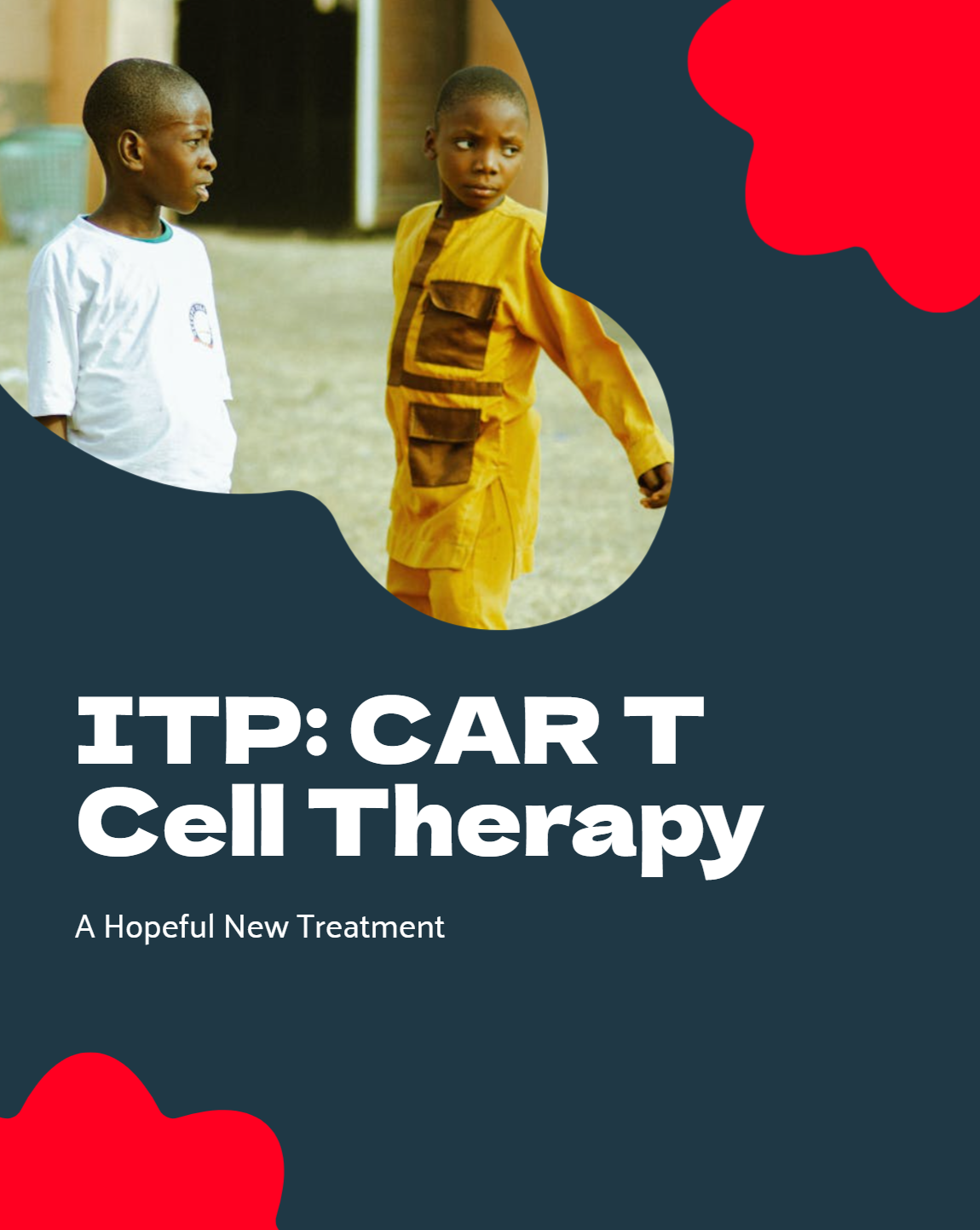
Primary immune thrombocytopenia (ITP) is a condition where the immune system mistakenly attacks platelets, the cells responsible for blood clotting. When standard treatments fail to control the condition, patients are left with few options. Recently, CD19 CAR T Cell Therapy has emerged as a promising salvage treatment. In this article, we break down the science behind this approach, discuss the challenges of multi-refractory ITP, and explore the future of CAR T therapy. {insert image here + image idea: A simplified diagram showing the interaction between CAR T cells and target cells in ITP}
What is ITP?
ITP is an autoimmune disorder in which the body's immune system mistakenly destroys its own platelets. This results in a low platelet count, leading to symptoms like easy bruising, frequent nosebleeds, and prolonged bleeding from cuts. For many patients, the condition is chronic, and managing it can be challenging.
Symptoms and Challenges in ITP
Patients with ITP often experience:
The variability in symptoms and the chronic nature of ITP often make it a difficult condition to treat, especially when traditional therapies do not work.
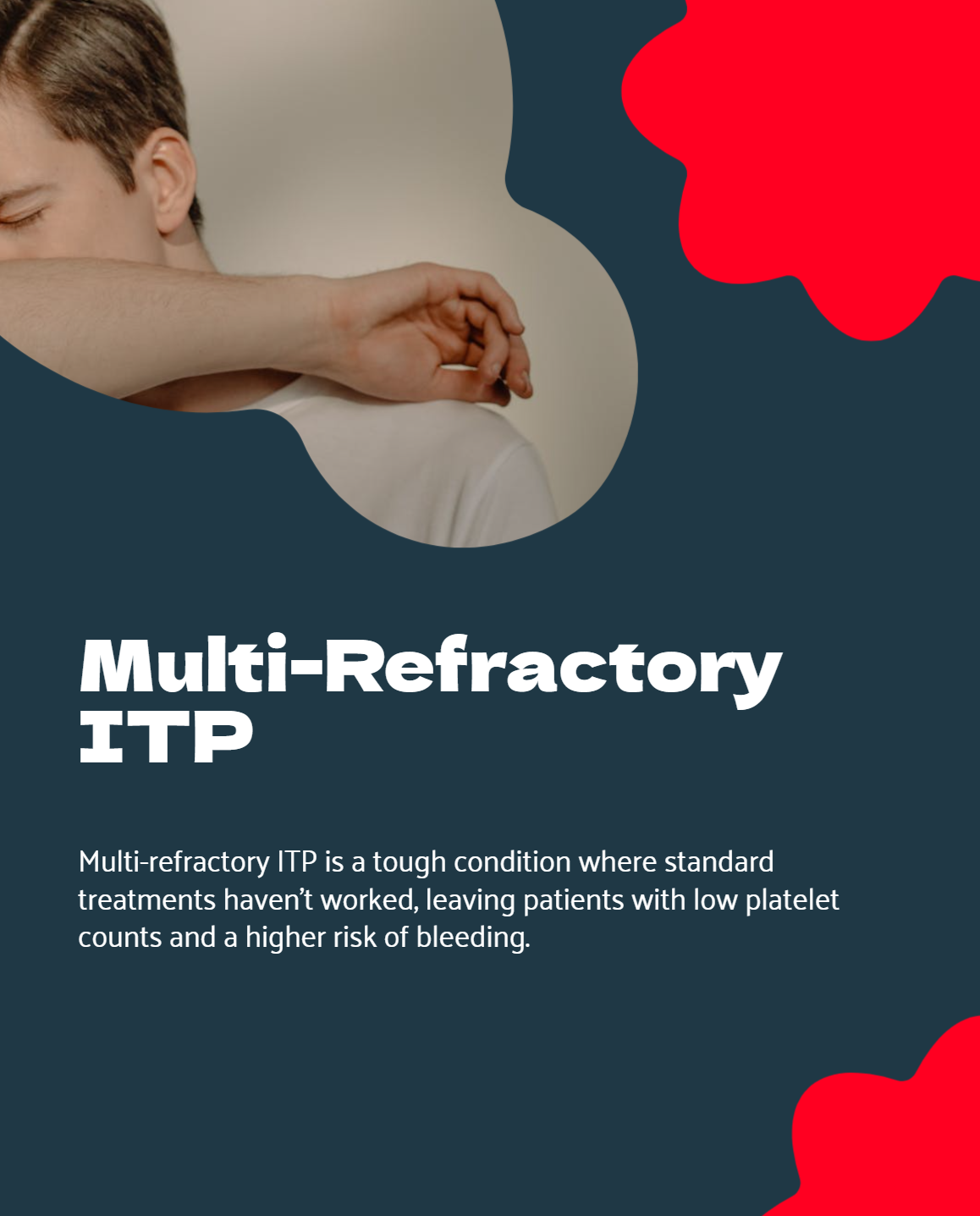
Standard Treatments and Their Limitations
Traditional treatments for ITP include corticosteroids, immunoglobulins, and sometimes splenectomy. While many patients respond to these treatments, a subset becomes refractory, meaning they do not achieve lasting improvement. In multi-refractory ITP, patients have tried several standard therapies with little or no success. This failure of treatment options leaves them vulnerable to severe bleeding and a diminished quality of life.
Standard treatment limitations include:
For patients with multi-refractory ITP, innovative treatments such as CD19 CAR T Cell Therapy offer new hope.
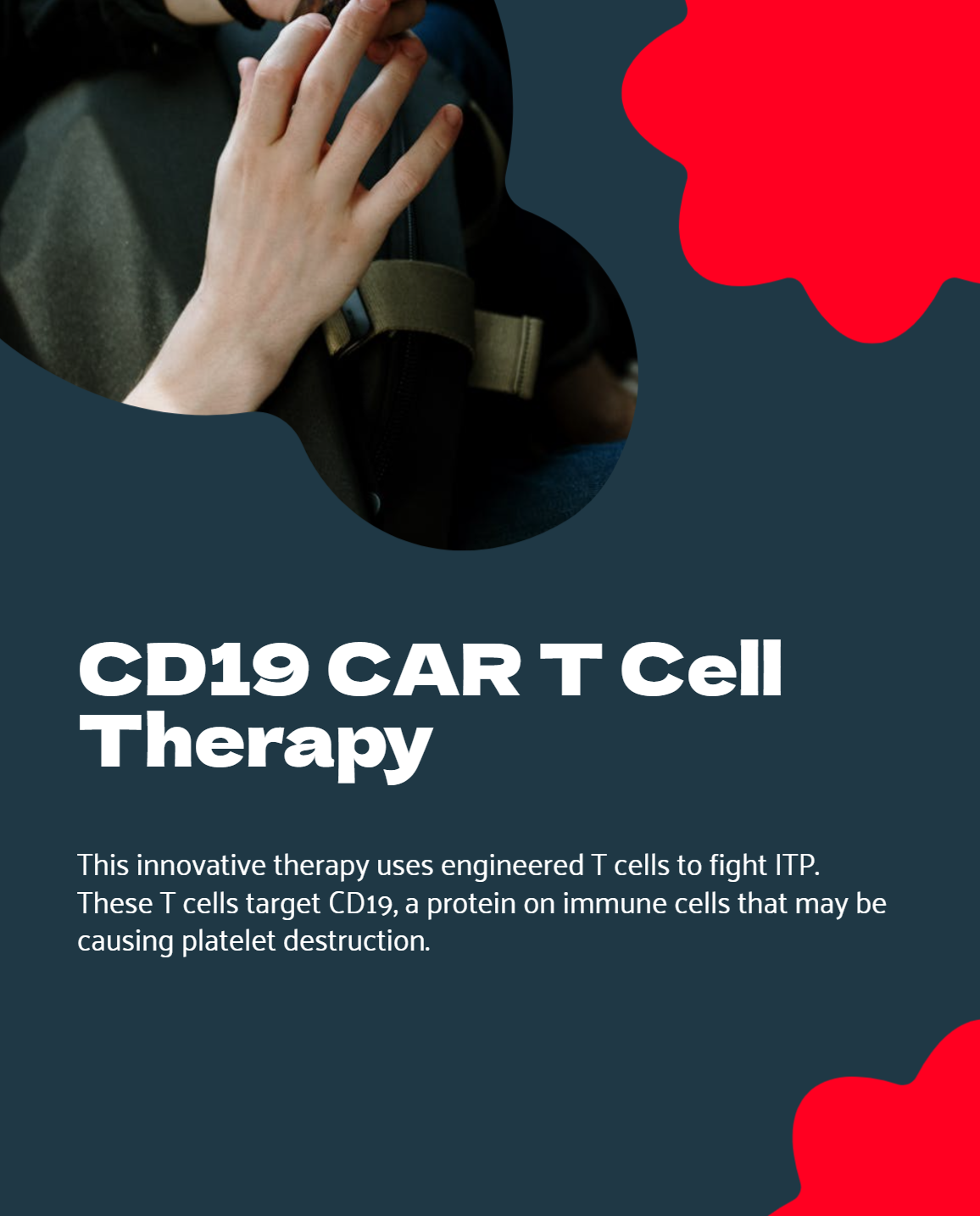
What are CAR T Cells?
CAR T cells are immune cells that have been genetically modified to recognize and attack specific targets. In the context of ITP, these cells are engineered to target CD19, a molecule found on certain immune cells that are thought to be involved in the autoimmune attack against platelets.
How CD19 CAR T Cells Work
CD19 CAR T Cell Therapy works by:
This process harnesses the patient’s own immune system to fight the autoimmune process that leads to platelet destruction. {insert image here + image idea: A flowchart of the CAR T cell production process from collection to reinfusion}
The mechanism of action for CD19 CAR T cells involves several key steps:
Below is a simplified table comparing the mechanism of action between traditional treatments and CAR T Cell Therapy:
| Aspect | Traditional Treatments | CD19 CAR T Cell Therapy |
|---|---|---|
| Method of Action | Immunosuppression/immune modulation | Targeted cell destruction |
| Duration of Effect | Often short-term, requiring repeated doses | Potentially long-lasting by re-educating the immune system |
| Side Effects | Broad immunosuppression side effects | Specific immune reactions and cytokine release |
| Patient Response Variability | High variability | More consistent response due to targeted approach |
This table helps to visualize why CAR T Cell Therapy is considered a promising alternative for patients who have not responded to standard treatments.
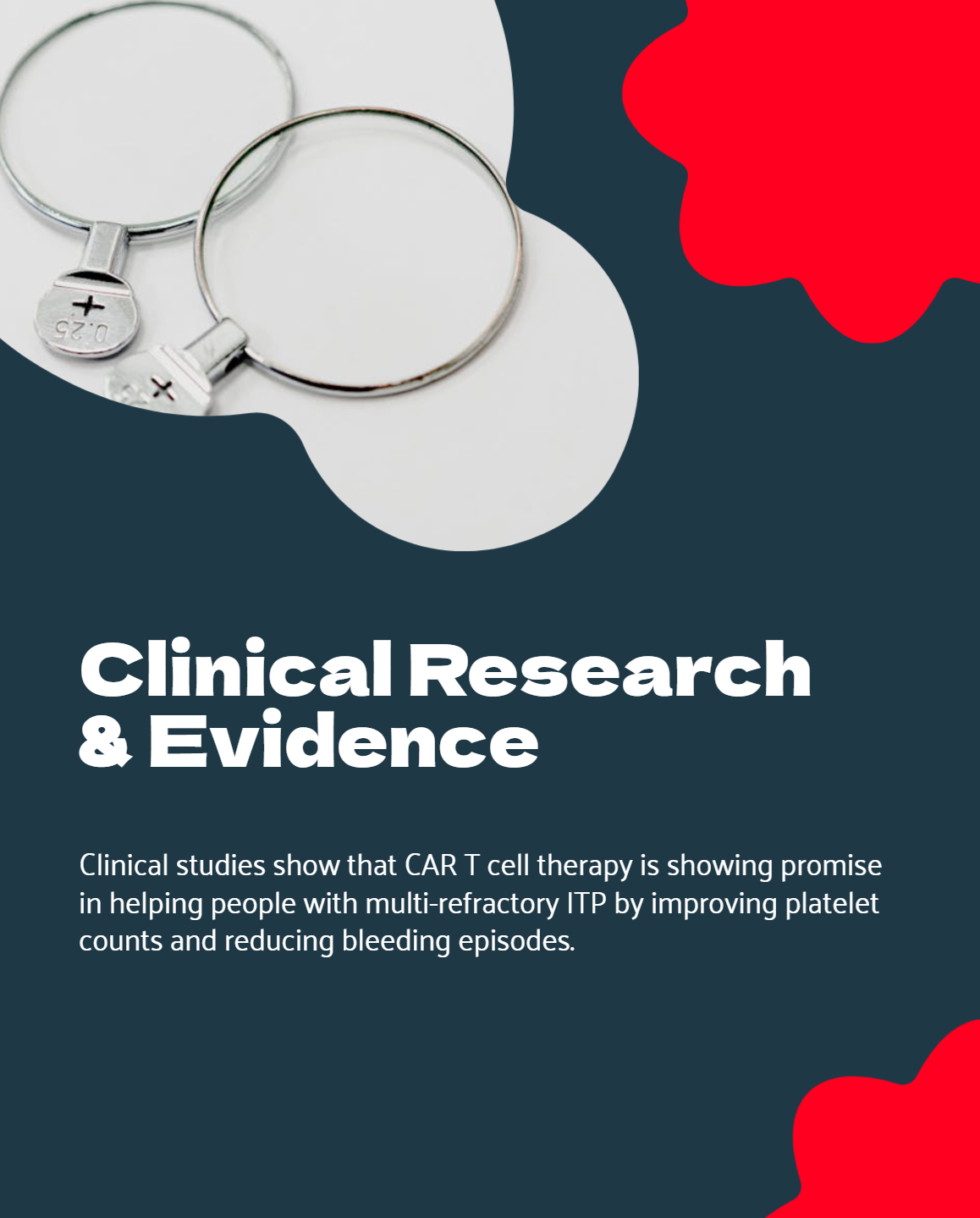
Clinical Studies and Research Data
Clinical research on CD19 CAR T Cell Therapy has shown encouraging results. Early Studies have indicated that patients with multi-refractory ITP may experience significant improvement after receiving the treatment. Researchers have observed:
The encouraging results from these Studies offer hope for a new era in treating multi-refractory ITP, where the immune system is retrained to stop attacking the body’s platelets.
These cases highlight the potential of CAR T therapy to change the landscape of treatment for patients with refractory ITP.
Patient Selection and Preparation
Choosing the right patient for CD19 CAR T Cell Therapy is crucial. The process involves:
This rigorous selection process ensures that those who are most likely to benefit from the treatment receive it.
The treatment process for CAR T Cell Therapy includes:
During follow-up appointments, doctors evaluate the patient’s response and adjust care as needed, ensuring a comprehensive treatment plan.
The field of CAR T Cell Therapy is rapidly evolving. Researchers are continually exploring ways to enhance the efficacy and safety of the treatment. Future directions include:
These innovations promise to make the therapy more accessible and effective for a wider range of patients with multi-refractory ITP.
Cost and Insurance Considerations
One of the challenges of CAR T Cell Therapy is its cost. The process of collecting, modifying, and expanding T cells is expensive. However, as research progresses and the technology becomes more widespread, costs are expected to decrease. We encourage patients and caregivers to:
While CD19 CAR T Cell Therapy is promising, it is not without risks. Potential side effects include:
Managing these side effects involves close monitoring, supportive care, and sometimes additional medications to control the symptoms. The care team works diligently to ensure that any adverse effects are managed promptly and effectively.
CD19 CAR T Cell Therapy is becoming a significant part of modern hematology. It represents a shift towards personalized and targeted treatments that offer hope to patients with conditions once deemed untreatable. The success of CAR T therapy in other areas, such as certain types of leukemia and lymphoma, has paved the way for its application in autoimmune disorders like ITP.
We see this therapy not just as a last resort but as a promising option for patients who have exhausted conventional treatments. Its development is a testament to the power of innovative science combined with clinical expertise. The future of hematology may well be defined by how effectively we can harness our immune system to fight diseases once thought to be unmanageable.
Real-world data on CD19 CAR T Cell Therapy for multi-refractory ITP shows a growing body of evidence supporting its efficacy. Patients who previously faced the risk of severe bleeding and lifelong medication dependence are now experiencing better quality of life and more stable health outcomes. This shift is particularly important for individuals who have not benefited from traditional treatments.
Table: Comparison of Patient Outcomes Pre- and Post-CAR T Therapy
| Outcome Parameter | Before CAR T Therapy | After CAR T Therapy |
|---|---|---|
| Platelet Count | Low and unstable | Increased and stable |
| Bleeding Episodes | Frequent and unpredictable | Significantly reduced |
| Dependency on Steroids | High | Reduced or eliminated |
| Overall Quality of Life | Poor due to chronic illness | Improved, with increased daily activity |
This table clearly illustrates the transformative impact of CD19 CAR T Cell Therapy on patient lives, supporting its role as a viable salvage treatment for multi-refractory ITP.
As we advance, it is important to consider how the integration of CAR T Cell Therapy into clinical practice represents not just a new treatment option but a paradigm shift. By reprogramming the immune system to recognize and eliminate harmful cells, this therapy offers a more permanent solution to an otherwise chronic condition. The journey from bench to bedside is well underway, and we are optimistic about the potential benefits for patients worldwide.
We are witnessing a time when medical science is not just about managing symptoms but about providing genuine cures. This shift empowers patients and healthcare professionals alike, creating a future where treatment is both effective and sustainable.
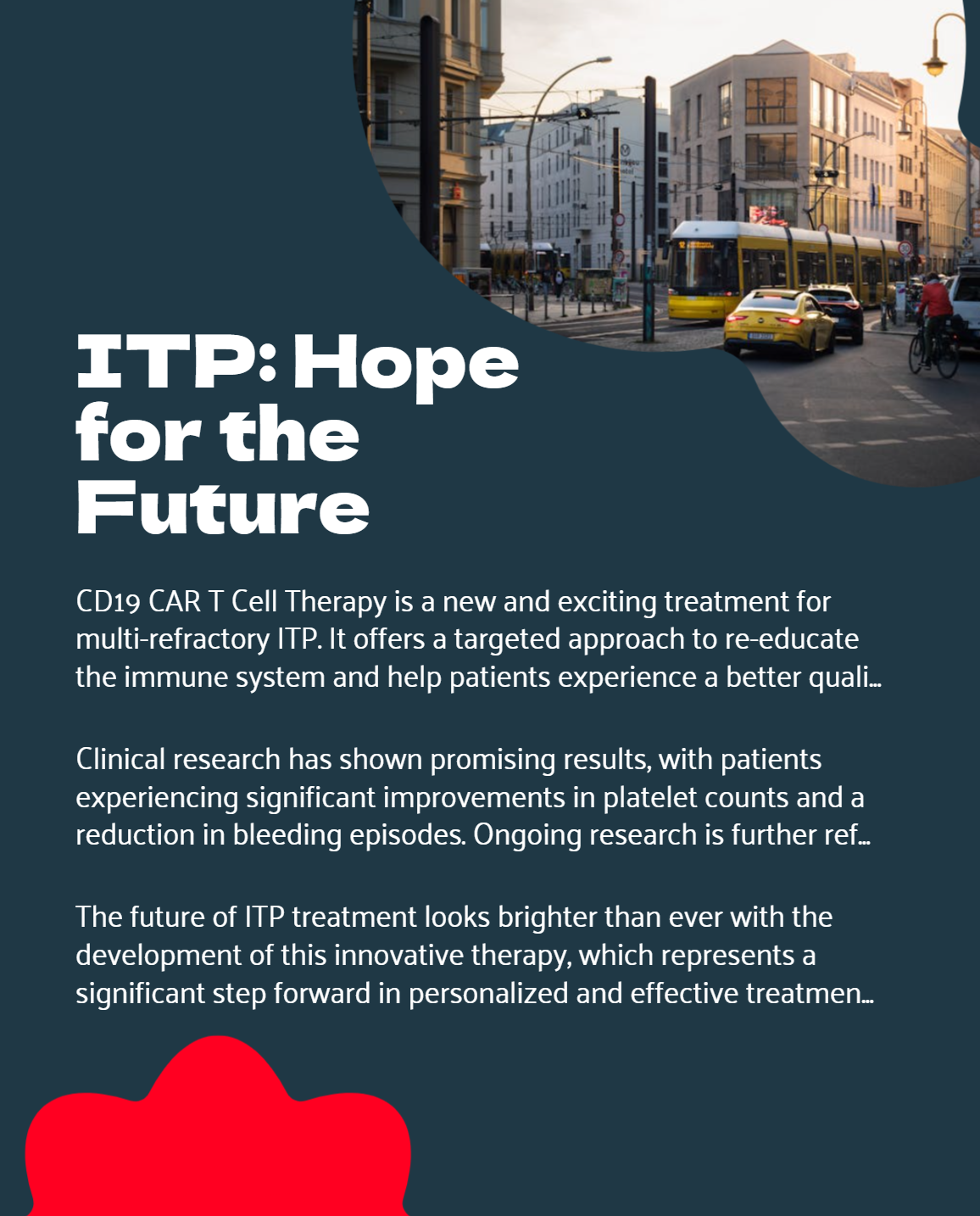
CD19 CAR T Cell Therapy is emerging as a groundbreaking salvage treatment for patients with multi-refractory primary immune thrombocytopenia. With its targeted approach, this therapy offers renewed hope for those who have not found relief with standard treatments. Through careful patient selection, rigorous treatment protocols, and ongoing clinical research, we are paving the way for a future where innovative therapies transform lives. As we continue to advance and refine these techniques, the promise of a better quality of life for patients with ITP becomes increasingly attainable.
1. What exactly is CAR T Cell Therapy?
CAR T Cell Therapy is an innovative treatment that involves modifying a patient’s T cells to express chimeric antigen receptors. These receptors enable the cells to recognize and attack specific targets, such as the CD19 antigen, which plays a role in autoimmune conditions like ITP.
2. How does CD19 CAR T Cell Therapy improve platelet counts in ITP patients?
By targeting and eliminating the immune cells that contribute to platelet destruction, CD19 CAR T Cell Therapy helps stabilize and increase platelet levels. This results in fewer bleeding episodes and an overall improvement in patient health.
3. Are there significant side effects associated with this therapy?
Yes, like any medical treatment, CAR T Cell Therapy can have side effects, including cytokine release syndrome (CRS), neurological symptoms, and an increased risk of infections. However, these are managed through careful monitoring and supportive care.
4. Who is eligible for CD19 CAR T Cell Therapy in the context of ITP?
Eligibility typically involves a comprehensive evaluation of the patient’s medical history, previous treatments, and overall health. Patients with multi-refractory ITP who have not responded to traditional treatments are often considered good candidates.
5. What does the future hold for CAR T Cell Therapy in treating autoimmune conditions?
The future is very promising. Ongoing research aims to refine the therapy, improve its safety profile, and explore its use in combination with other treatments. As these advancements are made, CAR T Cell Therapy could become a standard option for a broader range of autoimmune diseases.
 26.03.2025
26.03.2025